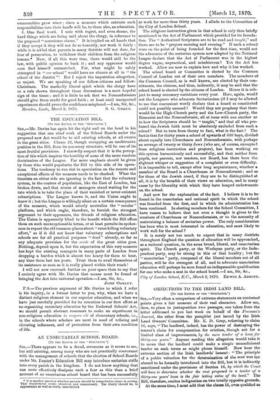THE EDUCATION BILL.
[TO THE EDITOR OF THE "SPECTATOR.')
SIR,—Mr. Davies has again hit the right nail on the head in his suggestion that one chief work of the School Boards under the proposed new Act would be to aid existing schools, at all events in the great cities. Clause 22, though occupying an unobtrusive position in the Bill, from its necessary structure, will be one of its most fruitful provisions. I shrewdly suspect that it is the percep- tion of this which inspires the hostility of some of the more resolute doctrinaires of the League. Far more emphasis should be given by those who would popularize the Bill to this side of its opera- tions. The tendency to run riot in speculation on the remote and exceptional effects of the measure needs to be checked. What the theorists on either side are ignoring is the fact that the voluntary system, in the centres of population, like the East of London, has broken down, and that scores of managers stand waiting for the rate which is to take the place of their vanished or never-existent subscriptions. The League knows it, and the Union ought to know it ; but the Ltague is willingly silent on a certain consequence of the measure, which would utterly neutralize the " secular" platform, and which ought, therefore, to furnish the strongest argument to their opponents, the friends of religions education. The Union is apparently blind to the benefit which the Bill offers them on such unexceptionable terms, or at least permits its spokes- men to repeat the old common-places about' rates killing voluntary effort," as if it did not know that voluntary subscriptions and schools are for all practical purposes " dead " already, so far as any adequate provision for the needs of the great cities goes. Nothing,. depend upon it, but the expectation of this very measure has kept the existing managers in many parts of London from dropping a burden which is almost too heavy for them to bear, any time these last ten years. Trust them to avail themselves of its assistance as soon as it is really placed within their reach !
I will not now encroach further on your space than to say that I entirely agree with Mr. Davies that means must be found of bringing the Act into universal operation.—I am, Sir, &c., JonN OAKLEY.
P.S.—The previous argument of Mr. Davies to which I refer is his inquiry, in a former letter to you, why, when we have a distinct religious element in our superior education, and when we have just carefully provided for its retention in our first effort at re-organizing secondary education by the Endowed Schools' Act, we should permit abstract reasoners to make an experiment in non-religious education in corpore viii of elementary schools, i.e., in the schools where scholars are most in need of refining and elevating influences, and of protection from their own condition of life.


































 Previous page
Previous page